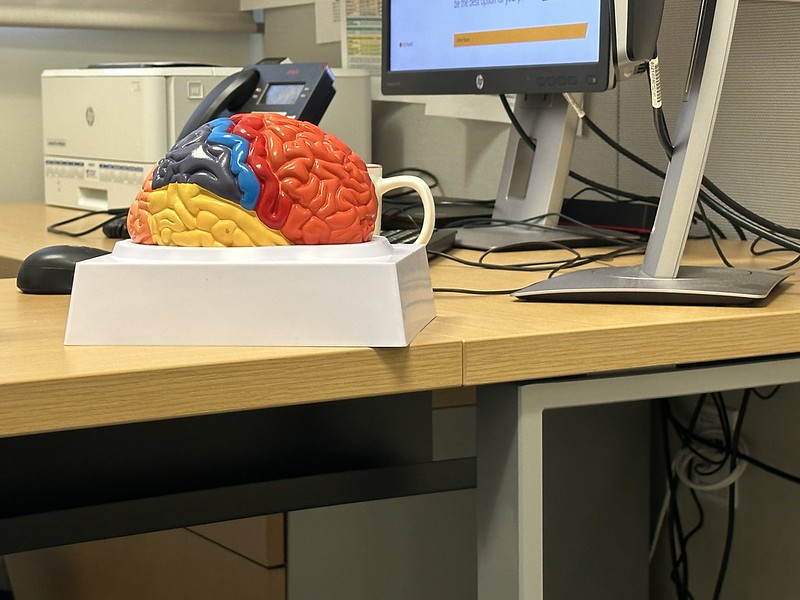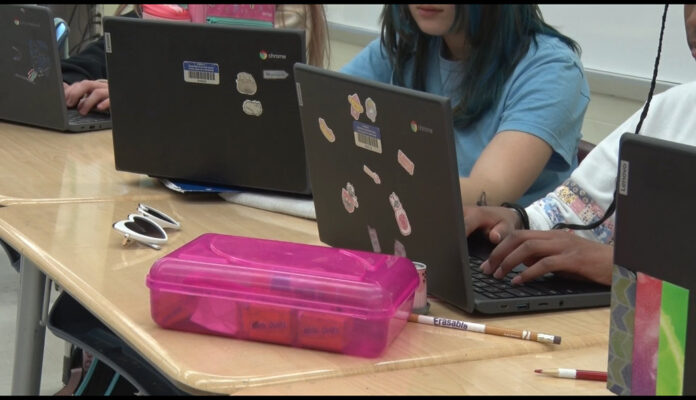Connor attends Bailey Bridge Middle School in Chesterfield County and enjoys basketball, baseball, Taekwondo, musicals and reading. He understands that at age 12 he is considered part of Generation Alpha, people born between 2010-24.
Connor enjoys the benefits of technology; it helps prevent handwriting cramps, provides some entertainment and helps him connect with loved ones.
But, Connor also has a wise insight about overuse.
“I try to limit it sometimes but, I usually try to keep like less than three hours a day,” Connor said. “I think it’s good for my health and for my eyes and sleep and everything.”
The social media platforms and technology prior generations have been introduced to slowly over time are ingrained in the daily lives of Generation Alpha: smart phones and watches, desktops and laptops, tablets, gaming consoles, and virtual headsets. This generation and its predecessor Generation Z are often the focus of discussion concerning how screen time will impact them.
Connor, and several of his classmates, believe technology can be managed “with the right help and right people in your life.”
Over the past decade, teen access to smartphones increased by 22 percentage points, according to the Pew Research Center.
Teens also continue to use social media platforms at high rates. Some described their social media use as “almost constant,” according to a fall 2023 Pew Research Center survey of over 1,400 U.S. teens.
Mental Health and Self Satisfaction
A 2023 state survey found Virginia middle school students have anxiety, depression and suicidal thoughts.
Almost 100,000, or 54%, of students surveyed reported problematic depressive thoughts, feelings or behaviors within a one-year period, according to the study.
Within a two-week time frame:
– 20.5% of surveyed students reported experiencing depression.
– almost 24% of surveyed students reported experiencing anxiety.
– over 22,000 surveyed students, or 11%, reported seriously considering suicide.
Mental health began to worsen in adolescents and young adults as social media gained popularity in the mid-2000s, according to research published in the American Economic Review. The number of major depressive episodes increased 83% between 2008 and 2018. Suicides also increased and are now the second leading cause of death for individuals 15–24 years old.
A quasi-experiment from the researchers found one of the biggest drivers of negative effects on mental health was students’ ability to engage in unfavorable social comparisons to others online.
Teddi, a Bailey Bridge student, is a singer and avid horseback rider. She knows people think her generation spends too much time on their phones, but said it is not their fault because they were raised with technology.
“I feel like it’s just kind of in us now,” she said. “We’re just so used to it and people from like Gen Z and the other generations they don’t know, because they’ve been raised with other things, but we’ve been raised with technology.”
Teddi has a phone but is not allowed to have her own social media accounts. Still, she said it is difficult not to compare herself to the seemingly perfect lives of influencers.
“But sometimes it’s just hard seeing all those like people, influencers and stuff,” she said.
Teddi’s mom reassures her that she does not know if the influencer’s life is actually perfect behind the camera, and to be her own person.
Almost 45% of eighth and 10th grade students reported daily spending over three hours on social media, according to the 2022 Monitoring the Future study. The ongoing study annually surveys a robust sample of students and adults on a wide range of behaviors, attitudes and values.
The self satisfaction of students in eighth and 10th grades dropped sharply in the past decade, according to Monitoring the Future data.
Over 21% of students agreed in 2012 that they were satisfied with themselves. Ten years later that number dropped to 9.2%
Addictive Feeds and Screen Time
Lawmakers, school counselors, parents and guardians continue to monitor the high use of technology and social media among youth.
Sen. Schuyler VanValkenburg, D-Henrico, introduced Senate Bill 359 in this year’s General Assembly session. This bill aimed to restrict social media companies from deploying addictive algorithmic feeds for minors, unless parents give consent.
“Over the last couple years, as a teacher mostly, but as a parent as well, I’ve seen a change in how kids interact with phones,” VanValkenburg said.
Some of the biggest concerns are around reading level, attention span and socialization, according to VanValkenburg.
Statewide reading and math test scores for middle school students dropped during the 2020-21 school year. Math scores dropped by almost 40%, and still have not returned to pre-pandemic levels. The drop in reading scores was not as significant and are tracking closer to pre-pandemic levels.
“I think schools are not just trying to get kids back academically, although primarily they are doing that,” VanValkenburg said. “They’re also trying to get kids back socially as well.”
The addictive feed bill passed the Senate unanimously, but was pushed to 2025 in the House. This will give legislators more time to research since technology was a hot topic in this year’s session, VanValkenburg said.
Republicans and Democrats introduced at least seven bills regarding social media regulations, including consumer data protections to restricted hours on social media for minors, but most did not advance from the subcommittee.
The lack of policy puts the burden of regulation on parents, who also may struggle with appropriate use. VanValkenburg still navigates the best usage of technology for himself and his children, he said.
Technology can help enhance education, but it can also shorten people’s attention span, promote misinformation and poorly affect mental health, VanValkenburg said.
Talia also attends Bailey Bridge. She loves reading and playing softball, which helps her keep off social media, she said. She did not enjoy the shift to online school during the pandemic, because it felt like she was “stuck on a screen.”
She is allowed on TikTok but her account is private. Her mom follows her and checks to ensure Talia has not looked at anything inappropriate.
Talia advises Gen Alpha to read a book or hang out instead of being glued to the phone.
“You’ll kind of start to think differently if you watch it a little bit too much because maybe you’re seeing things that you shouldn’t be seeing and you’re more scared of going out places,” Talia said.

Afraid to be Bored
Child and adolescent psychiatrist Dr. Mudit Kumar works with families at the VCU Children’s Hospital.
No one currently understands the long term impact of digital technology on Gen Alpha, or anyone, Kumar said.
Social media creates opportunities for people to meet like-minded people and find shared interests.
“You can do so many new things using the technology, and again that might help your self-esteem at times, so there definitely are a lot of positives,” Kumar said.
However, some studies show social media scrolling activates many parts of the brain, much like the repetitive hook of slot machines, and a noticeable change occurs, according to Kumar. Instant gratification from a phone makes it harder for people to let themselves be bored.
“I think boredom is really where creativity and imagination thrives and we really don’t get much of it anymore,” Kumar said.
He encouraged parents to learn more about technology and be a part of the learning process for children, Kumar said. A balance of technology is best.
“We are growing at such a fast pace, especially the technology,” Kumar said. “I think it’s sometimes hard to keep up the research and keep up the policy.”
Few companies examine the risk involved when the bottom line is about profit, Kumar said.
The Bailey Bridge students talked a lot about the importance of friendships, playing outside, getting sunshine and “touching grass.” Gen Alpha will eventually grow up and be the ones in charge. But for now, Connor has some parting words for other generations.
“You’re gonna miss good things in your life if you’re just doing the same thing on your phone all the time,” he said.
By Thailon Wilson, Capital News Service / Video by Karli Woodcock, VCU InSight

